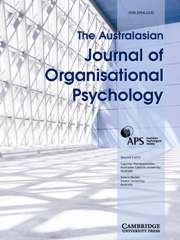Crossref Citations
This article has been cited by the following publications. This list is generated based on data provided by
Crossref.
Zuckerman, Miron
Silberman, Jordan
and
Hall, Judith A.
2013.
The Relation Between Intelligence and Religiosity.
Personality and Social Psychology Review,
Vol. 17,
Issue. 4,
p.
325.
Murray, Aja L.
Johnson, Wendy
McGue, Matt
and
Iacono, William G.
2014.
How are conscientiousness and cognitive ability related to one another? A re-examination of the intelligence compensation hypothesis.
Personality and Individual Differences,
Vol. 70,
Issue. ,
p.
17.
Furnham, Adrian
and
Cheng, Helen
2014.
The social influences on trait Conscientiousness: Findings from a nationally representative sample.
Personality and Individual Differences,
Vol. 69,
Issue. ,
p.
92.
Cheng, Helen
Eysenck, Michael
Green, Andy
and
Furnham, Adrian
2014.
Correlates of adult functional memory: Findings from a British cohort.
Intelligence,
Vol. 47,
Issue. ,
p.
134.
Dumfart, Barbara
and
Neubauer, Aljoscha C.
2016.
Conscientiousness Is the Most Powerful Noncognitive Predictor of School Achievement in Adolescents.
Journal of Individual Differences,
Vol. 37,
Issue. 1,
p.
8.
Rikoon, Samuel H.
Brenneman, Meghan
Kim, Lisa E.
Khorramdel, Lale
MacCann, Carolyn
Burrus, Jeremy
and
Roberts, Richard D.
2016.
Facets of conscientiousness and their differential relationships with cognitive ability factors.
Journal of Research in Personality,
Vol. 61,
Issue. ,
p.
22.
Stadler, Matthias
Aust, Miriam
Becker, Nicolas
Niepel, Christoph
and
Greiff, Samuel
2016.
Choosing between what you want now and what you want most: Self-control explains academic achievement beyond cognitive ability.
Personality and Individual Differences,
Vol. 94,
Issue. ,
p.
168.
Furnham, Adrian
and
Treglown, Luke
2018.
High potential personality and intelligence.
Personality and Individual Differences,
Vol. 128,
Issue. ,
p.
81.
Gorgol, Joanna
Stolarski, Maciej
and
Matthews, Gerald
2020.
On the moderating role of chronotype on the association between IQ and conscientiousness: the compensation effect occurs only in Evening-types.
Biological Rhythm Research,
Vol. 51,
Issue. 2,
p.
318.
Cerni, Tania
Di Benedetto, Annalisa
and
Rumiati, Raffaella I.
2021.
The Contribution of Personality and Intelligence Toward Cognitive Competences in Higher Education.
Frontiers in Psychology,
Vol. 12,
Issue. ,
Stieger, Mirjam
Liu, Yujun
Graham, Eileen K.
DeFrancisco, Jenna
and
Lachman, Margie E.
2021.
Personality change profiles and changes in cognition among middle-aged and older adults.
Journal of Research in Personality,
Vol. 95,
Issue. ,
p.
104157.
Saw, Khin Nyunt Nyunt
and
Han, Buxin
2022.
Prospective Teachers’ Academic Success in Myanmar: Successful Intelligence and Personality Effects.
Journal of Education for Teaching,
Vol. 48,
Issue. 1,
p.
72.
Minnigh, Tyler L.
Sanders, Jennifer M.
Witherell, Stephanie M.
and
Coyle, Thomas R.
2024.
Grit as a predictor of academic performance: Not much more than conscientiousness.
Personality and Individual Differences,
Vol. 221,
Issue. ,
p.
112542.
Granziol, Umberto
and
Cona, Giorgia
2024.
Architecture and relationships among cognition, mental health and other human domains revealed by network analysis perspective.
Current Psychology,
Vol. 43,
Issue. 6,
p.
4945.


